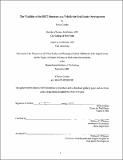The viability of the REIT structure as a vehicle for real estate development
Author(s)
Gumbs, Byron (Byron Terence), 1970-
DownloadFull printable version (4.840Mb)
Alternative title
Viability of the real estate investment trusts structure as a vehicle for real estate development
Other Contributors
Massachusetts Institute of Technology. Dept. of Urban Studies and Planning.
Advisor
William C. Wheaton.
Terms of use
Metadata
Show full item recordAbstract
Little, if any, research has been published on development-oriented real estate investment trusts (REITs), as a category. This thesis examines the viability of the REIT format for the real estate development process. Capital is the life-blood of any development concern, and, as such, particular attention is paid to the processes pertaining to the access of funds, the subsequent allocation of funds, and the underlying logic governing these decisions. This paper reviews industry articles, past studies on the effects of development on REIT performance, and interviews with key personnel of the REITs and private development firms profiled in this thesis. I conclude that the REIT format is an effective vehicle for real estate development although skilled management is vital to exploiting its inherent potential. Development-oriented REITs are distinguished from their conservative REIT brethren by their objectives. REITs that shun development add value for shareholders through the active management of property holdings, whereas REIT-developers adopt strategies that are focused on creating and adding value through real estate development. Additionally, some of the strategies adopted by development-oriented REITs are unrelated to development but related to value-creation. Development-oriented REITs may engage in development, joint ventures with capital providers or private developers with specific expertise, the disposition or acquisition of assets, share repurchases, and lastly, the solicitation of capital. The REITs profiled in this thesis are manufacturers of real estate assets, which are focused on value creation through development. This paper will: 1. focus on the application of the REIT structure by development firms and the factors governing their decisions regarding investment and the generation of shareholder value; and 2. investigate the potential of the REIT structure beyond passive real estate ownership and determine its value to development-oriented public companies with aggressive value-creation agendas.
Description
Thesis (S.M.)--Massachusetts Institute of Technology, Dept. of Urban Studies and Planning, 2001. "September 2001." Includes bibliographical references (p. 97-100).
Date issued
2001Department
Massachusetts Institute of Technology. Department of Urban Studies and PlanningPublisher
Massachusetts Institute of Technology
Keywords
Urban Studies and Planning.